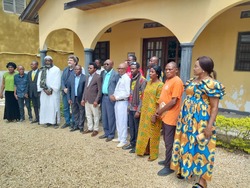24 May 2023
Collective letter:
Development bank mediation between PHC/Feronia and DR Congo communities is off to a bad start, after four years of procrastination
The International Complaint Mechanism (ICM) of the German, French and Dutch development banks has conducted its first mediation sessions with the oil palm plantation company PHC and the nine communities in the DR Congo that filed a complaint in 2018. The communities had to wait more than four years for this process to begin. During this time, PHC's ownership changed, the development banks withdrew from the company and it was taken over by a private equity fund based in Mauritius.
In 2020, when the European banks announced their withdrawal, they officially committed to maintain the ongoing mediation process between the company and local communities “with the support of the new owners and DFIs". The European banks must ensure that the mediation is inclusive, impartial and adequate rather than committing to support the implementation of a potentially bad agreement resulting from an inadequate mediation process.
So far, however, the mediation process and the results of its initial sessions are weak and troubling. The doubts that we have expressed about the process are being confirmed: the ICM appears inadequate for resolving the legacy land conflicts that are at the root of the complaint and of the violent tensions between the company and the communities. Moreover, in their complaint, the villagers had insisted on the need for resources, especially independent legal support, to ensure a level playing field. This has not been provided. The ICM panel also failed to provide communities with the necessary information to prepare for the mediation, in particular the legal documents relating to the land in question and relevant company documents such as the latest financial reports and registration documents. In addition, no specific funding was provided to RIAO-DRC, the organisation mandated to accompany the communities, to prepare the communities for the process.
The sessions took place against a backdrop of violent repression of communities, with many community members in prison for allegedly stealing palm nuts from the company's plantations. The sessions were held in provincial capitals, far from the communities, and only a small number of community representatives were able to attend. In the absence of an adequate budget, RIAO-RDC was not able to accompany the communities properly, as in Mbandaka for example and the costs RIAO-RDC incurred for organising and participating in the sessions have not yet been fully reimbursed, although the budget had been set by the ICM panel.
The mediation must focus on the communities' main claim: that their ancestral lands were taken from them without their consent during the Belgian colonial occupation, before being granted as a concession to Unilever and then PHC/Feronia. The ICM panel cannot ignore this or continue to deflect the mediation by calling on the communities to accept the presence of PHC on their lands. There was only one resolution from the initial sessions dealing with the land issue and it is woefully insufficient: the creation of a tripartite land commission composed of representatives of the communities, PHC and the government. According to the resolution, this commission will investigate PHC's land titles and, only in the case of Lokutu, assess how the titles were acquired. But, as the resolutions states, the commission will only consider whether PHC's activities extend beyond the boundaries of its titles. The commission is not clearly mandated to assess whether the titles were acquired on the basis of free, prior and informed consent of the communities or whether PHC has put the lands it claims into production - issues that were central to the original complaint. In the absence of consent and/or use of the land, the land titles should be revoked and the use and control of the land returned to the communities.
In order to rectify this situation, we demand that the development banks and their governments ensure that the ICM takes the following steps:
-
Expand the mandate of the tripartite commission to determine whether PHC has acquired its land titles through free, prior and informed consent of the communities and to determine what areas PHC has not put into production;
-
Provide a sufficient budget to allow for adequate community and RIAO-DRC participation, as well as the use of independent legal counsel to support the work of the tripartite commission and the upcoming mediation sessions;
-
Immediately reimburse RIAO-DRC for all expenses related to the first mediation sessions; and
-
Organise future sessions of the mediation process close to the communities so that more community leaders can participate and observe the process.
One of the key agreements reached in these early mediation sessions was the immediate release of villagers detained in prison following mass arrests by the police and army, acting in collaboration with PHC security guards. It would appear that these villagers are still in prison, more than a month after the agreements reached at the mediation session.
We call on the ICM panel to make every effort to ensure that these prisoners are released immediately.
Signed by
Réseau d'Information et d'Appui aux ONG nationales (RIAO-RDC) - DR Congo
CNCD-11.11.11 -Belgium
Concertation Nationale des Organisations Paysannes du Congo (CNOP) - République du Congo
Confédération Paysanne du Congo -Principal Regroupement Paysan (COPACO-PRP ) - DR Congo
Corner House - UK
Entraide et Fraternité - Belgium
FIAN Belgium
FIAN Germany
GRAIN
HEKS/EPER - Switzerland
Jeunes Volontaires pour l'Environnement - Côte d'Ivoire
Muyissi Environnement - Gabon
Oakland Institute - US
Réseau des Acteurs du Développement Durable (RADD) - Cameroon
Réseaux des femmes braves (REFEB) - Côte d'Ivoire
Rettet den Regenwald - Germany
Struggle to Economize Future Environment (SEFE) - Cameroon
Synergie Nationale des Paysans et Riverains du Cameroun (SYNAPARCAM)
Voice of the Earth Initiative - Nigeria
Women’s Network Against Rural Plantation Injustice (WoNARPI) - Sierra Leone
World Rainforest Movement
Young Volunteers for the Environment - Ghana














